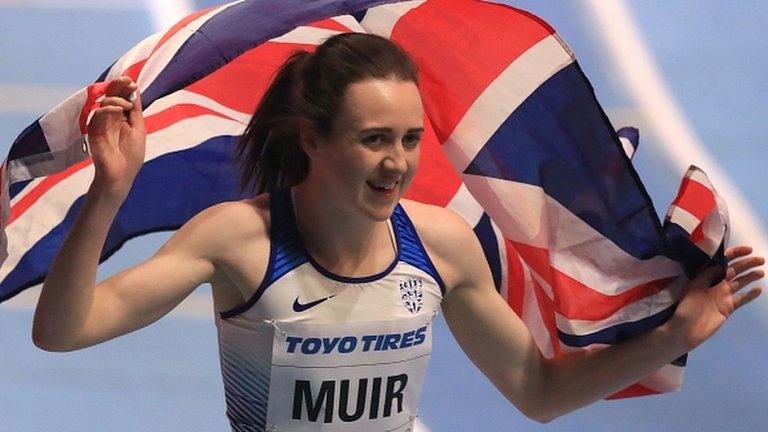World records proposal by European Athletics: Which star names would lose out?
- Published
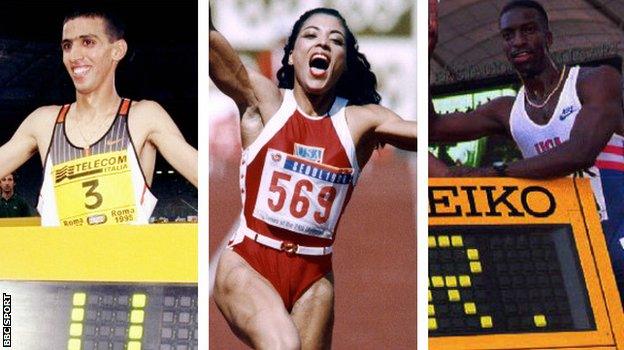
Hicham El Guerrouj, Florence Griffith-Joyner and Michael Johnson could lose their world records
Scores of athletes could be stripped of their world records under new proposals from European Athletics.
The governing body only wants records to be recognised if they can stand up to strict new criteria, part of attempts to make a clean break with the sport's doping scandals.
As a result, any records set before 2005 are now at risk - almost half of the 146 men's and women's indoor and outdoor records. These include marks that have never been subject to suspicion, prompting an outcry from many of the existing record holders.
Seven of the eight men's field events world records and the women's 100m, 200m, 400m and 800m marks could go.
Olympic champions including Florence Griffith-Joyner, Michael Johnson, Hicham El Guerrouj and Jonathan Edwards will fall off the world record list on to an 'all-time list' if the proposals are ratified by the the sport's governing body, the International Association of Athletics Federations (IAAF), in August.
Meanwhile, athletes who have competed after 2005 may soon find themselves with a 'WR' next to their name if the sport's record achievements are - in the words of IAAF chief Lord Coe - "recalibrated".
Athletics world records: Eight famous records which could be lost
The Britons
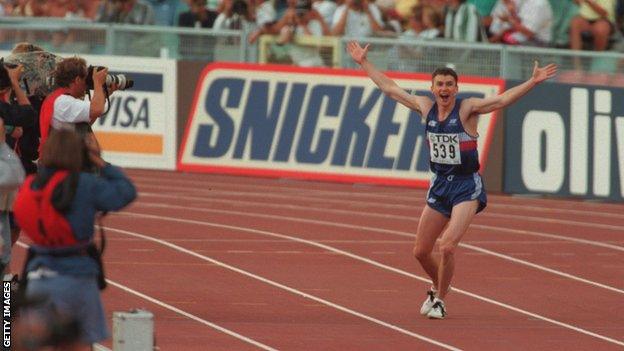
Edwards broke the world record twice as he won gold at the 1995 World Championships
Edwards' triple jump record of 18.29m, set in 1995, is among the long-standing records under threat.
The Olympic, world and European champion jumped into the history books at the 1995 World Championships in Gothenburg as he became the first man to pass the 18-metre mark. American Christian Taylor, who jumped 18.21m in August 2015, would in all likelihood be promoted to world record holder.
Long-distance runner Paula Radcliffe set a world record of two hours 15 minutes 25 seconds in the 2003 London Marathon using two male pacemakers. Her record would be taken by this year's London winner Mary Keitany, who finished in 2:17:01.
Welsh hurdler Colin Jackson set the indoor 60m hurdles world record of 7.30secs in 1994, and Britain can still lay claim - for now - to the 4x200m indoor relay record of 1:21.11, set in Glasgow in 1991 by a team that included Linford Christie, who won Olympic 100m gold the following year.
Flo Jo
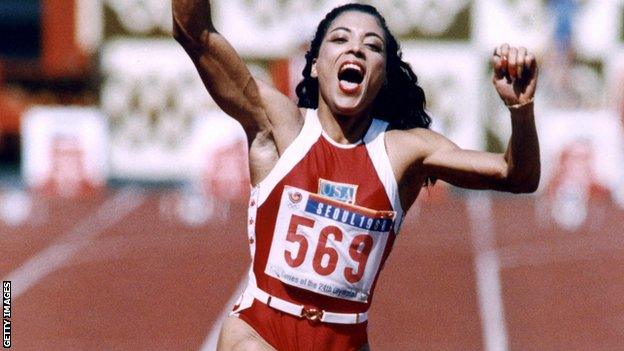
Flo Jo was a three-time Olympic gold medallist
American sprinter Griffith-Joyner, also known as Flo Jo, won three gold medals at the 1988 Seoul Olympics.
The former world champion, who died aged 38 in 1998, still holds the 100m and 200m world records. She ran 10.49secs at the US Olympic trials at the University at Indianapolis in July 1988 and then two months later set the 200m world record of 21.34secs at the Games in South Korea.
Fellow American Carmelita Jeter would potentially move up from second on the all-time 100m list with her 2009 time of 10.64secs.
The European Athletics proposals include scrapping the records of anyone caught doping, even if the record was set outside the time period in which they were proven to be cheating. That could mean Dutch sprinter Dafne Schippers taking the new 200m record with her time of 21.63secs set in 2015. She is currently third on the list but drug cheat Marion Jones' legal time of 21.62secs from 1998 would also be removed from the books.
Hicham El Guerrouj
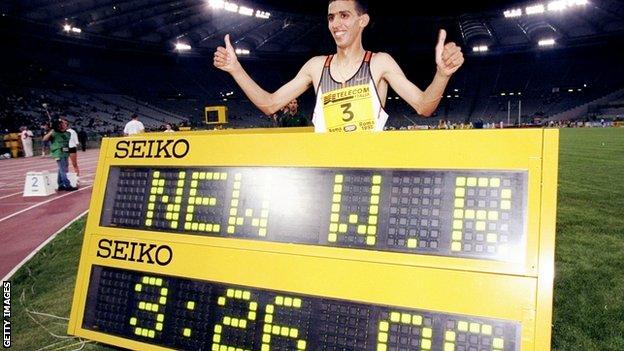
El Guerrouj won four consecutive world titles
One of the biggest casualties from the rule change could be Moroccan middle-distance runner El Guerrouj, who stands to lose five world records.
The 42-year-old, who is a double Olympic champion and four-time world champion, is the current 1500m, one mile and 2,000m record holder.
In 1998, in Rome, El Guerrouj broke the 1500m record with a run of three minutes 26 seconds. In 1999, also in Rome, he set a new mark for the mile with a time of 3:43.13 and then later that season he set a new 2,000m record of 4:44.79 minutes in Berlin.
El Guerrouj also holds the indoor 1500m and mile world records, which he set in 1997.
His 1500m mark would go to Kenya's Olympic champion Asbel Kiprop, who would move up from third on the list with a 2015 time that was only 0.69 seconds behind El Guerrouj's record.
More dramatically, American Alan Webb could jump from eighth on the all-time list for the mile to take the record with a time from 2007 that is more than three seconds slower than El Guerrouj's mark.
Australian Craig Mottram would take the 2,000m world record with his time from 2006 of 4:50.76, despite being 10th on the all-time list.
Mike Powell
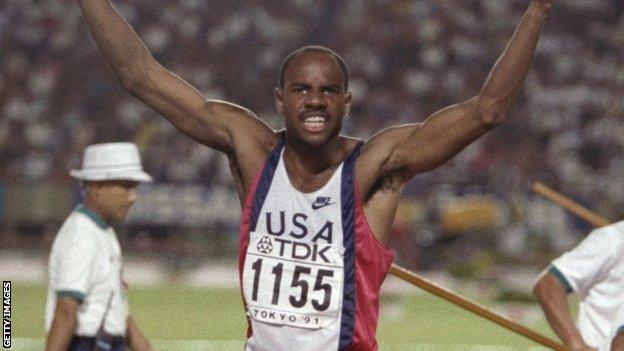
Powell set his long jump record at the 1991 World Championships
American long jumper Mike Powell, a two-time world champion, set his record of 8.95m 26 years ago at the 1991 Tokyo World Championships, breaking the existing record by five centimetres - Bob Beamon's legendary leap from the Mexico City Olympics that had itself stood for 23 years.
With Powell and Beamon's jumps chalked off and nine-time gold medallist Carl Lewis' jump of 8.87m from 1991 also not eligible, the record would most likely go to another American, Dwight Phillips, who would move up from fifth with his 2009 leap of 8.74m.
Jan Zelezny
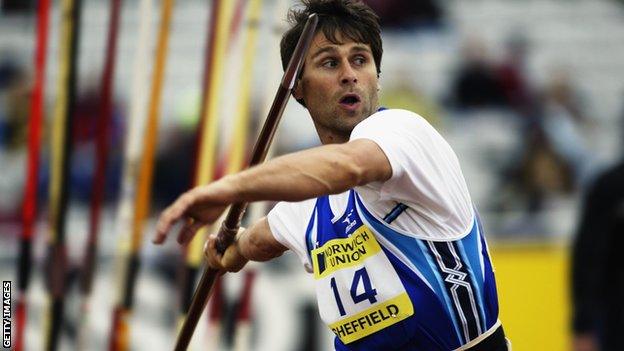
Zelezny was three-time Olympic and World champion
Three-time Olympic javelin champion Jan Zelezny, a rival of Britain's Steve Backley, threw 98.48m in Germany in 1996. His world record is still more than five metres further than the second best throw of all time. Kenya's Julius Yego currently has the third best of all time but his 92.72m throw in 2015 would be in line to take top spot under the new criteria.
Michael Johnson
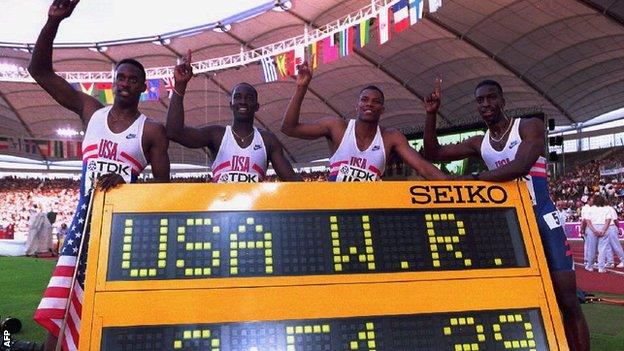
Johnson (far right) alongside his US teammates at the 1993 World Championships
Four-time Olympic gold medallist Johnson has already lost his 200m world record to Jamaican superstar Usain Bolt and his 400m mark to South Africa's Wayde van Niekerk and could be about to lose a third.
Johnson was part of the US team that ran a time of 2:54.39 in the 4x400m relay at the 1993 World Championships. Harry Reynolds, Andrew Valmon and Quincy Watts made up the quartet.
Kenenisa Bekele
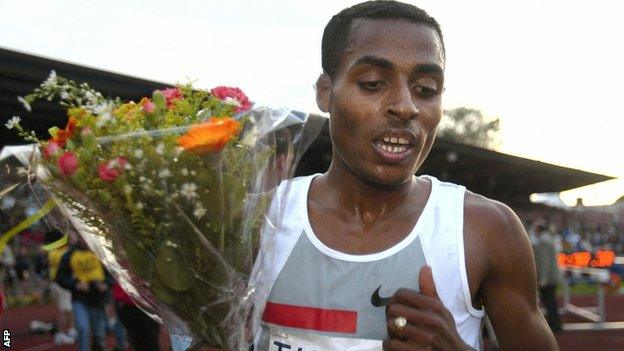
Bekele is considered one of the greatest distance runners of all time
Ethiopian long-distance runner Kenenisa Bekele is a three-time Olympic and five-time world champion and also the 5,000m and 10,000m record holder. It's the former record that he might soon lose as his time of 12:37.55 was set in May 2004. It would go to countryman Dejen Gebremeskel who is fifth on the existing list with 12:46.81, nine seconds off Bekele's record.
Who else could become a new record holder?
American Sanya Richards-Ross would take one of the most controversial records, the women's 400m. That was set in 1985 at 47.60 seconds by Marita Koch, who competed for the former East Germany.
The next four athletes on the current list, including Sydney Olympic champion Cathy Freeman, who ran her best time at the 1996 Atlanta Olympics, would also be erased from the record books, leaving Richards' 48.70 as the best time. Only three other runners in the top 20 set their time after 2005 - Allyson Felix in Beijing in 2015 (49.26), Russia's Yuliya Gushchina (49.28) in 2012 and her compatriot Antonina Krivoshapka (49.16) in 2012 - and Krivoshapka was this year revealed to have tested positive for steroid turinabol during the re-examination of samples from London 2012.
Kevin Young is the only man to have run the 400m hurdles in under 47 seconds. His winning time of 46.78secs at the 1992 Olympics could be replaced by fellow American Kerron Clement's 47.24 set in June 2005.
Only two women have broken into the top 20 times in the women's 800m since 2005, and if Jarmila Kratochvílova of the former Czechoslovakia loses her 1983 record of 1:53.28, Kenya's Pamela Jelimo, third on the list, would be promoted with her 2008 time of 1:54.01.
American Jackie Joyner-Kersee's heptathlon points record of 7,291 from her Olympic gold-medal performance in Seoul in 1988 would be replaced by Carolina Kluft's 7,032 points from 2007. Britain's Jessica Ennis-Hill is currently third on the list.
- Published2 May 2017
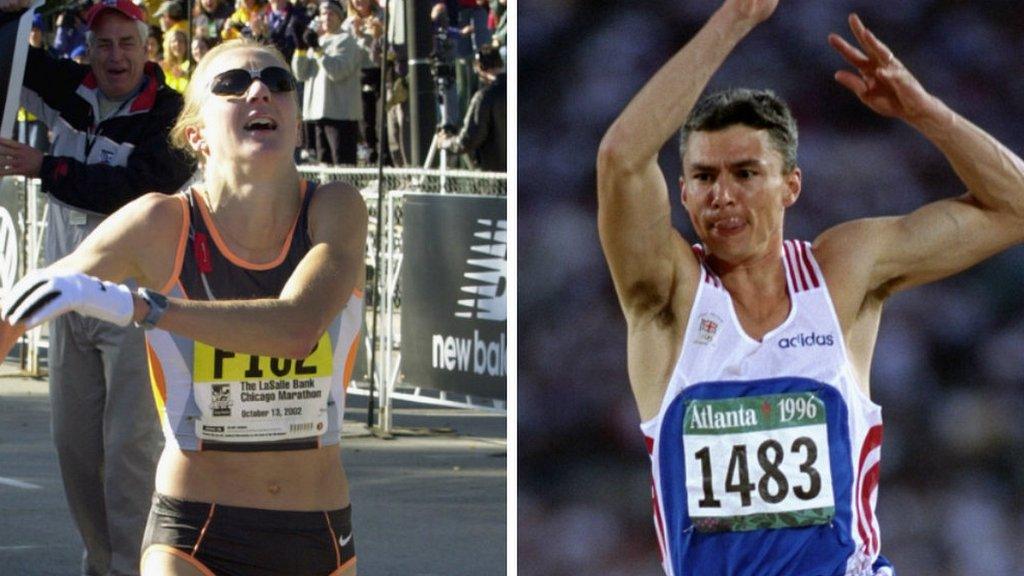
- Published3 March 2018
